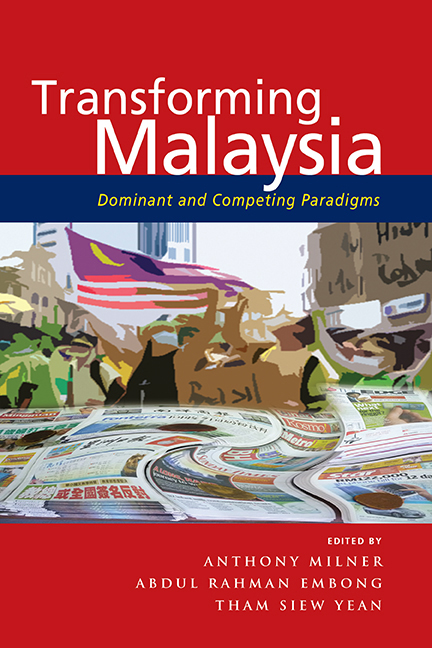Book contents
- Frontmatter
- Contents
- List of Tables and Figures
- Preface
- Acknowledgements
- List of Contributors
- 1 Introduction
- 2 Race and Its Competing Paradigms: A Historical Review
- 3 Knowledge Construction, the Rakyat Paradigm and Malaysia's Social Cohesion
- 4 Race Paradigm and Nation-Building in Malaysia
- 5 Race-Based Paradigm in Poverty Eradication and Income Distribution Analysis and Policy
- 6 Foreign Workers in Malaysia in the Post-Independence Era: Race Paradigm in State Policy, Academic Writings and Public Discourse
- 7 Trade Policy Formulation in Malaysia: Navigating between the Economic and Race Paradigms
- 8 National Security Conceptions and Foreign Policy Behaviour: Transcending the Dominant Race Paradigm?
- Index
Preface
Published online by Cambridge University Press: 21 October 2015
- Frontmatter
- Contents
- List of Tables and Figures
- Preface
- Acknowledgements
- List of Contributors
- 1 Introduction
- 2 Race and Its Competing Paradigms: A Historical Review
- 3 Knowledge Construction, the Rakyat Paradigm and Malaysia's Social Cohesion
- 4 Race Paradigm and Nation-Building in Malaysia
- 5 Race-Based Paradigm in Poverty Eradication and Income Distribution Analysis and Policy
- 6 Foreign Workers in Malaysia in the Post-Independence Era: Race Paradigm in State Policy, Academic Writings and Public Discourse
- 7 Trade Policy Formulation in Malaysia: Navigating between the Economic and Race Paradigms
- 8 National Security Conceptions and Foreign Policy Behaviour: Transcending the Dominant Race Paradigm?
- Index
Summary
Seeking to become a high income, developed and united country by 2020, Malaysia seems trapped. It is still viewed as a state searching for a nation — a country deeply divided into ethnic or racial blocs which do not share a national vision. Malaysia's challenge is enormous, as this volume explains. But it is also a challenge of ideas rather than straightforward social fact. The racial structure of Malaysia is in a critical way ideologically created — a paradigm — and the task of building a united nation state and national economy is one that cannot be left entirely to specialists in economics and political institutions.
As can be seen in the run up to, and the aftermath of the 13th general election held on 5 May 2013, the race paradigm has been raised sharply to the fore again as a weapon of mobilization, including by the right wing elements in the ruling UMNO and their supporters. The relevance of the debate on the race paradigm — which is the central theme in this volume — is immediately apparent in these developments. This volume examines the manner in which Malaysia's race paradigm was formulated and promulgated, and achieved dominance. It notes as well the presence and competition — and failure — of other societal paradigms, and then goes on to test whether or not the dominant paradigm is losing influence in specific practical areas of Malaysian life.
The volume focuses on ideas, but recognizes too that paradigms are formulated and contested in a political and economic context. The history of ideas has been neglected in Malaysian studies — and yet, in certain ways, it can help open up new possibilities. The mere reminder that the current Malaysian configuration is a construct — and has been challenged in the past — can be liberating. Examining the race paradigm in process, and in practice — also helps to identify ways in which it might be qualified or modified in the future, when economic and political imperatives seem to demand structural challenge.
- Type
- Chapter
- Information
- Transforming MalaysiaDominant and Competing Paradigms, pp. ix - xPublisher: ISEAS–Yusof Ishak InstitutePrint publication year: 2014



